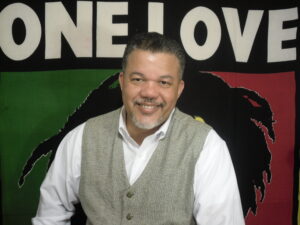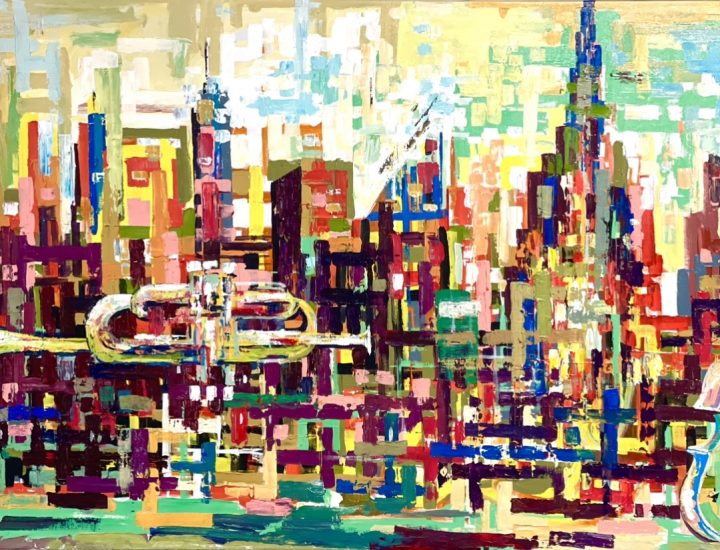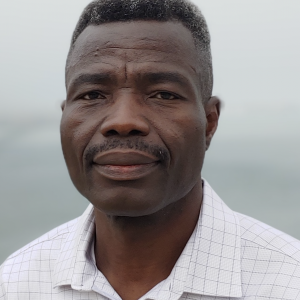By Geoffrey Philp
Simon Cartwright didn’t know who had started it, but he didn’t like it. Every morning as he circled the statue of his great-grandfather in Mount Airy’s town square and began his walk up to his home on the western side of the hill, street Arabs, as his father would have called them, assailed him: “Heart Health!”
I shouldn’t have changed my routine, he thought. Simon used to walk down the hill on the eastern side, which would take him through an almond grove and the entrance of the family hotel, renovated barracks, which the Cartwrights had owned for generations. But Simon had been avoiding Mable, the town drunk, who at six o’clock in the morning usually staggered home from some bar she had closed down.
Simon often wondered how Mable got the money to be drunk every day. But he figured even with her heavy drinking, she still retained some of her good looks and could tempt some poor fool with a promise of a poke in the dark for a few drinks.
Thank God and his father he had never been that foolish. His father had warned him about Mable from the time they were both thirteen years old.
He and Mable had been playing bat-up-and catch. When Mable threw the ball to him, he wanted to embarrass her, so he hit the ball as hard as he could straight at her. Somehow, miraculously, Mable caught the ball. Simon couldn’t believe his eyes.
“You’re out. You’re out,” Mable screamed.
“No, I’m not,” said Simon and he ran full speed toward her. “I’m not out if you drop the ball.”
“But I haven’t,” said Mable. “It’s still in my hand.”
“Yes, you did,” answered Simon. And as soon as Simon reached Mable, he began tickling her belly.
Mable dropped the ball.
“See you dropped the ball. I’m still not out.”
“Oh, yes you are,” said Mable. She began tickling Simon. At first, Simon wouldn’t laugh. But then, Mable by accident found a tender spot on his waist and he began laughing hysterically. She began tickling Simon behind his ears, nape, and under his chin. Soon they were both on the ground laughing and tickling each other. Their laughter rang through the house.
When Simon’s father, who was finishing his mid-day cognac and cigar, heard their laughter, he rushed to the front door only to see Simon and Mable rolling on the ground, covered from head-to-toe with dirt.
“Simon, how many times I must tell you not to play with that likkle nayga gyal?”
“But…”
“But nothing. All that good for nothing nayga gyal wants to do is to breed with you and saddle you with a likkle bugger that you will have to take of for the rest of your life. But I’ll have none of it. None. Now get you raas up here before I have to come down there.”
“Dad…”
“You think I’m afraid to tear your raas in front of her. I will do it you know, boy. Tear your raas in front of her.”
Simon looked up at his father and then, back at Mable. He picked up the ball and handed it to Mable.
“I’m out,” he said.
“Now,” said his father. “Leave that black bitch alone and come in the house now.”
Simon picked up his cricket bat and walked up to the verandah to be with his father. By then, Mable’s mother, the Cartwright’s maid, had sneaked around the corner where the hydrangeas bloomed. She comforted Mable who was bawling uncontrollably.
That was the last time that Simon had seen Mable. Tears streaking down the front of her face, covered with dirt. Her mother never brought Mable back to the house.
Throughout the years, Simon’s father would remind him about how right he had been about Mable. She had dropped out of high school, technical school and even when Mable’s mother got her a job at the hotel, she’d failed at that too. Yet as far as Simon was concerned, these were just rumors. That wasn’t the girl he once knew. Mable was bright and could catch a ball too.
“Just think of the future I saved you from,” said his father. “I promised your mother before she died, that you’d graduate from St. George’s and you have. If I hadn’t rescued you, you would have four likkle brown pickni to take care of in a shack down by the sea.”
“Would it have been all that bad?” asked Simon.
“I can still tear your raas, you know that?Right?”
“Yes, Dad,” said Simon.
Simon never had a chance to have another extended conversation with his father. After he graduated from St. George’s, Simon’s life fell into the predictable pattern of his peers. He went to college in Florida, came back to Jamaica, took over the family business, and got engaged.
At the news of his son’s impending marriage, Simon’s father was so happy he suffered a massive heart attack and died, cigar in hand, on the verandah. Simon buried him in a small chapel by the sea that overlooked the bay where the ships that had brought many of the town’s ancestors to Jamaica.
Devastated by his father’s death, Simon threw himself into managing the hotel. He put into practice everything he had learned in college about hospitality management, including quality check controls and mandatory CPR training for all hotel employees. Soon his hotel was named one of the top hotels in Jamaica by Fodor’s. Simon worked so hard that at the relatively young age of forty-six, he suffered a heart attack. His doctor, Ralph Singh, told him it was a wake-up call.
“You got the message now,” said Ralph. “Take care of your heart and stop smoking.
“My father drank and smoked until he was into his late seventies,” said Simon.
“You are not your father,” said Ralph.
“That’s the problem,” said Simon as he put on his shirt. “He was a good man. Now that I’m old enough to know what he did, as a single father working his ass off to put me through high school and college, I can never thank him enough.”
“You can thank him by staying alive and giving him heirs to carry on the family name.”
“With who?”
“Things are that bad at home?
“You would never know, Ralph.”
“Sorry to hear, my friend. But you never know. Start paying attention to your wife and things might turn around. But first, stop the smoking and start exercising.”
Easy enough, thought Simon. He had always been a star athlete at St George’s and his coach had once remarked that Simon had run the sweetest leg of a 4×400 relay race in the history of St. George’s. The coach recommended Simon for the Penn relays and he represented Jamaica in the Commonwealth Games.
When Simon went to college, he had turned out for the track team, but the coach never liked him. Simon figured he needed to work on his speed, so every morning, he’d put on his sweat suit that he’d worn in the Commonwealth Games and jogged along the rolling hills of Tallahassee. That was until one morning, he was hit in the back with a Slurpee.
“Nigger,” screamed the kids from the back of the truck.
Simon cleaned off the mess and went back to his dorm. When Dennis, his roommate, came back to the dorm, Simon was still in a foul mood.
“Why would they call me a nigger?”.
Dennis didn’t know what to say. As far as Dennis was concerned, he was a country boy from Georgia. White was white and black was black. Dennis never could understand the intricacies of the color hierarchies of the islands, even after he and Simon had discussed the issue over a couple of Red Stripes and a few spliffs.
“Anyone from the islands is a nigger,” said Dennis. “Besides, you were running around with JAMAICA on your back. What did you expect? For them to come out of the truck, inspect you, and then say, “Oh, we’re sorry, you aren’t a nigger.’ Get real, Simon.”
“That’s not the point. In Jamaica, I’m white.”
“America is not Jamaica. Get used to it, brother.”
“How many times do I have to tell you not to call me that?”
After that incident, Simon stopped exercising and the habit stayed with him until he came back to Jamaica. But now that Ralph had given Simon an incentive, he began exercising.
He turned over the day-to-day operations of the hotel to his manger and devoted himself to getting fit. Still, Simon began slowly. He started walking down the hill, circling the statue and then back up the hill. But after three weeks, he could feel his old form coming back and he started sprinting.
One morning before sunrise, near the foot of the hill, Simon felt as if he was back at St George’s. As he circled the statue and headed back to up the narrow path, which he knew by heart, he tripped over something in the dark.
“What the fuck?”
Simon fell forward and tore his left knee on stones that jutted from either side of the path.
“Simon, is that you?” It was Mable. Drunk and sprawled out on her back.
“Look what you made me do?”
Simon grabbed his leg. His ankle was twisted.
“Simon, is that you? Are you okay?”
“Don’t call my name.”
“Why?”
“Just don’t.”
“Why? Because I’m an old nayga gyal? Because I’m a black bitch?”
Simon didn’t answer her. Mable watched Simon as he hobbled away. She vowed Simon would never see her drunk again. She would clean up her life. Make something of herself. Perhaps get some work at the hotel.
Simon tried to forget about the incident. When his wife asked him about the injury, he said he tripped over a cotton tree root. But from his tone, she suspected he was lying. She kissed her teeth and walked away.
After a month of recuperation, Simon decided to exercise again. Even if he and his wife got divorced, he could still catch impress some young filly from Kingston, as he had done with his wife, with his heritage, money, and good hair.
He put on his sweat suit and headed down the western side of the hill, which took him into middle of the town, where the likkle hooligans, another favorite of his father, saw him and began questioning him.
“White man. White man. Why you running so fast?”
At first, Simon ignored them. But they began following him up to the edge of the hotel to the almond grove. As soon as he got inside the hotel grounds, they stopped at the gate. Fear must be genetic, he thought.
The next morning, the crowd of hooligans had grown, but this time Simon was ready. He sprinted as fast as he could and quickly outpaced them before they could even catch him. He ran to the top of the hill, proud of himself. He darted up to the verandah and was just about to tell his wife about his victory when he saw her coming out of the house with suitcases in either hand.
“I’m going back to live with my mother,” she said. “Our lawyers will be contacting yours.”
Although he saw it coming, Simon went inside the house, found an old pack of Rothmans, sat on the verandah, and smoked the entire pack. This soon became a habit. He would jog in the morning, dodge the street Arabs, and smoke a few cigarettes with a few shots of Appleton for lunch. This balances everything, he thought.
For the next month, Simon continued his routine without answering the children until he thought he would quiet them.
“White man, white man, why you running so fast?”
“Heart health,” said Simon.
The children started shouting, “Heart Health! Heart Health.” It was the worst thing he could have done. Now they had a name. His father had once said, “Once the hooligans named you, you were as good as dead.” Simon began running faster, but this morning they seemed faster than before.
“Heart Health. Heart Health,” they continued. Their voices ringing through the hills and down to the bay.
Simon quickened his pace, but they still kept up with him. They seemed to relish the name that streamed from their lips and around the hillsides.
“Heart Health! Heart Health!”
Simon could see the almond grove ahead. If he made it to the gates, he would lose them. Plus, he saw one of the maids entering the grave from the east side. Maybe she could help him to get away from these likkle nayga pickni who were bothering him. They always listened to their own kind. Especially their black mummas.
Simon dashed full speed into the almond grove, but they followed him inside. They were now fearless. They were like sharks. They smelled blood.
“Heart Health! Heart Health!”
“Get away from that man,” the woman screamed.
At the sound of her voice, Simon felt a sharp pain in his chest and fell forward into the sand. It was Mable She was dressed in a maid’s uniform.
Mable scurried toward Simon and turned him over. She was shocked to see his face.
“Simon, is that you? Are you okay?”
Simon held his chest. He couldn’t breathe. Mable bent over to give him mouth-to mouth resuscitation as she had learned in her orientation at the hotel.
“No…” he whispered.
“Why not?”
Mable’s face was almost touching his, but he turned away.
“Don’t.”
“You would rather die than have our lips meet?”
Simon pulled at his shirt and turned over his palm as if to say stop. Mable turned to the boys. “Go to the hotel and get some help for this man” The boys didn’t move.
“Hel…”
Mable bent over to help Simon, but he was turning blue. She tried pumping his chest, but he wouldn’t respond. She tried again to give him mouth-to-mouth, but with the last of his remaining strength, he pushed her away. The boys came closer and surrounded him.
“White man, white man, what happen to your heart health?”
Simon looked up at the sunlight streaming through the almond leaves. He tried to listen to sound of the waves in the bay where his father was buried. But only the only sound he could hear was the echo of the boys’ voices ringing in his ear.
Heart Health! Heart Health!”

Geoffrey Philp is a poet and fiction writer who teaches English at Miami Dade College, where he also chairs the College Preparatory Department. A critically acclaimed author, Philp’s work has appeared in numerous journals and anthologies, including the Oxford Book of Caribbean Short Stories and the Oxford Book of Caribbean Verse. His most recent collection of poems, Dub Wise (2010) was published by Peepal Tree Press. He maintains a blog @ geoffreyphilp.blogspot.com


